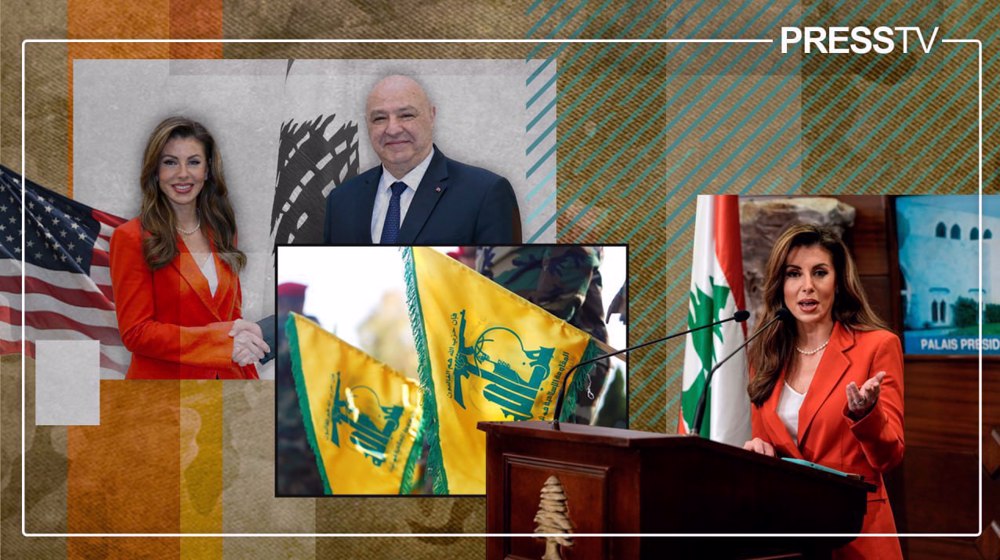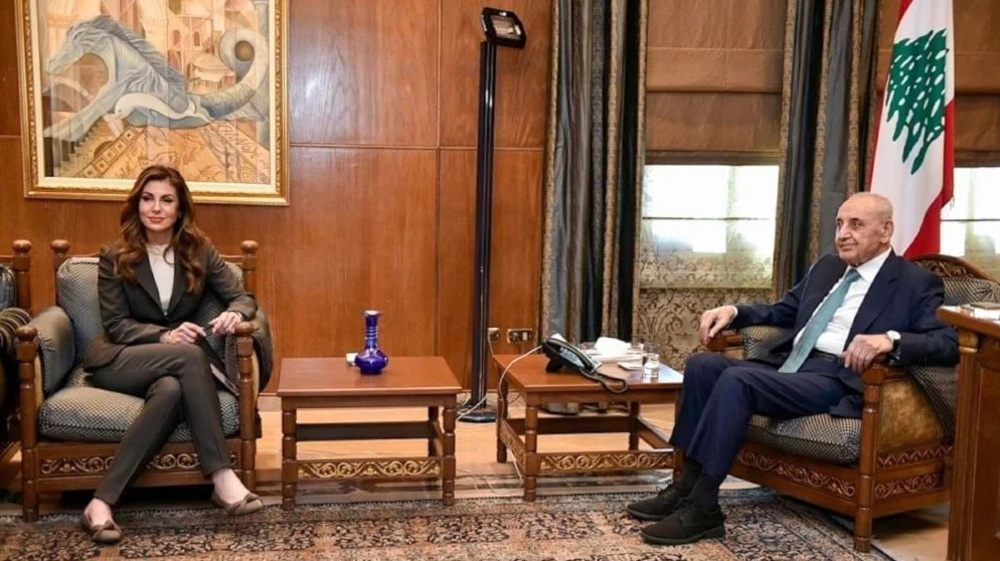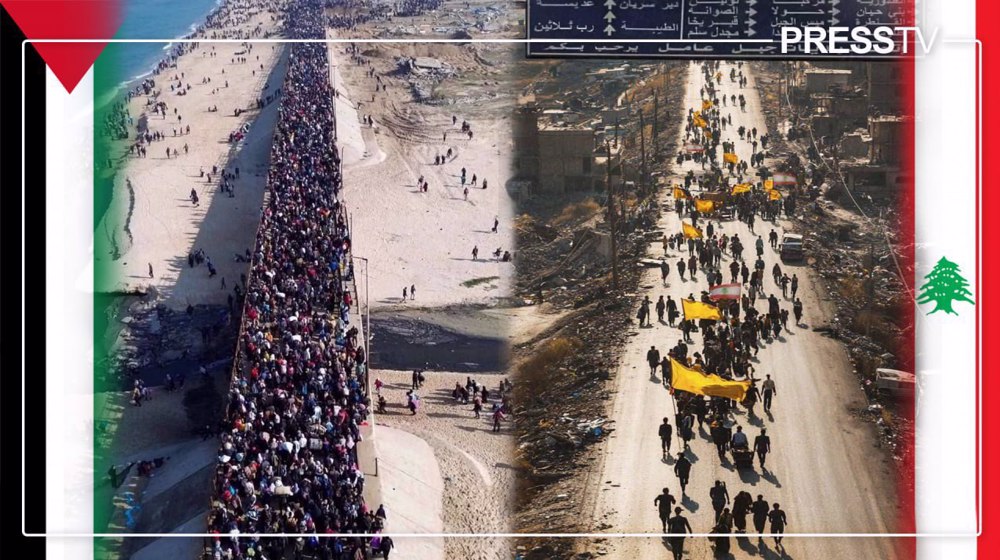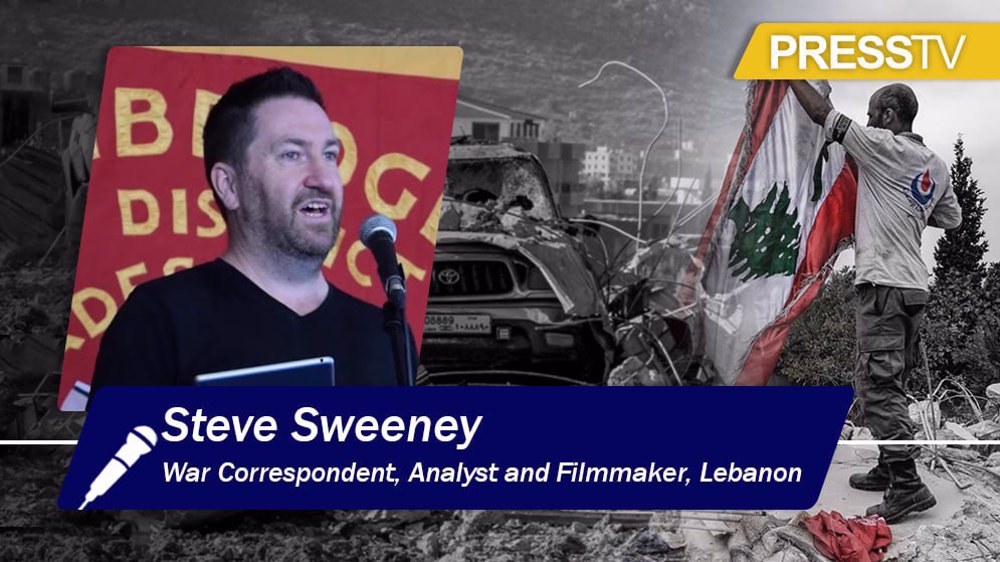‘This is our land’: Lebanese woman on why she confronted Israeli Merkava tank
By Hiba Morad
In a remarkable faceoff on January 26, an unarmed young Lebanese woman stood firmly before Israeli military forces, embodying defiance in the face of the Zionist occupation.
Surrounded by nearly 20 heavily armed Israeli infantry soldiers, an imposing Merkava tank, and multiple military vehicles, she stood on her feet, challenged the Zionist forces, and refused to retreat.
The epic encounter, which has since grabbed many headlines, became a testament to the unyielding strength and resilience of the Lebanese people, including women, against the Zionist enemy.
In an exclusive conversation with the Press TV website, Zahraa Kobeissy said she was not afraid.
"It was as if the Israelis were afraid of me and my words, afraid of my confidence in the face of their intimidation," said the Lebanese activist, recalling that incident.
Though wounded by eight shrapnel pieces and bleeding, her determination never wavered.
She was discharged from a hospital in Lebanon earlier this week after undergoing multiple surgical procedures to remove the shrapnel from various parts of her body.
On January 26, as the 60-day deadline for Israeli military withdrawal from southern Lebanon came to an end, thousands of Lebanese civilians returned to their villages, defying Israeli threats.
The people from southern Lebanon decided to reclaim the land that is rightfully theirs.
Videos captured the extraordinary bravery of civilians standing face to face with the Israeli occupation army, refusing to yield, despite dozens of them being showered with bullets.
One video particularly went viral, featuring Kobeissy as she stood firm before an Israeli Merkava tank in occupied parts of south Lebanon. Her stance was resolute, her gaze unwavering.
The young woman had made up her mind. She would not retreat. She would not surrender.
‘This is our land’
In a freewheeling conversation with the Press TV website, Kobeissy recalled the incident that captured the imagination of the world and showed the true face of the resistance.
"Like thousands of other civilians, I went to southern Lebanon to reclaim our land, which is our ultimate right. I couldn't tolerate seeing our land in the hands of occupiers," Kobeissy told the Press TV website, her voice firm with conviction.
"It is our right to be on this land, and it is absolutely not the right of the Israelis to occupy Lebanon, just as they don’t have the right to occupy Gaza or Palestine. Like other civilians, I entered the bordering town of Maroun al-Ras. Some were martyred, and others wounded as Israeli soldiers opened fire on us," she hastened to add.

on January 26 in Maroun al-Ras, South of Lebanon.
Kobeissy recalled her march on foot that day, stepping past the Lebanese occupation army stationed there. At first, there was silence—no Israeli soldiers, no tanks, only the land she and so many others had come to reclaim. But then, the occupiers started to trickle in.
"When the Zionists saw me, they advanced and ordered me to retreat in English. I screamed back, telling them this is my land, and I wouldn’t retreat," she said, after which they opened the fire.
Rubber bullets tore through the air, and shrapnel pierced her body, leaving wounds. Blood stained her skin, but she stood firm and unwavering, still refusing to retreat from her own land.
“They fired at me, causing injuries, but I was determined to stand my ground, either until they left or until I was martyred," she told the Press TV website.
For Kobeissy and for other people in south Lebanon, surrender was not and will never be an option.
In the face of a Merkava
Israeli occupation soldiers, flanked by a Merkava tank, moved in to intimidate her. Video footage circulating on social media captured the tense moment.
However, Kobeissy stood her ground as the tank’s turret shifted menacingly, soldiers closing in around her, military vehicles circling in a menacing attempt to break her resolve.
"They were afraid other civilians would join me, and they hesitated to kill me, fearing it would incite other people to advance and result in major clashes. But I kept screaming back, telling them to return from where they came," the Lebanese activist recalled.
One Israeli soldier, visibly agitated and frustrated with her act of defiance, tried to silence her.
"One of the Israeli soldiers became irritated and tried to hush me, but I was determined to speak out. They seemed frustrated and decided to capture me. This soldier told me, 'you gave me a headache, stop screaming,' to which I replied, 'you have caused us headaches all our lives, you have caused the Palestinians headaches too, go back to where you came from.'"
Her response was spontaneous and powerful, which further angered the occupation forces.
In a bizarre turn, one of the soldiers then offered her a water bottle with Hebrew writing on it. Kobiessy rejected it outright.
"Do not pretend to be humane now. You are an invader, a usurper. Leave my land," she retorted.

‘Israelis afraid of me’
Kobeissy stood her ground and kept shouting at the occupation forces. She refused to move an inch.
"Wow, infantry soldiers heavily armed, a Merkava tank, and several vehicles, and you seem to be afraid of me, an unarmed woman with a loud voice! I am not afraid of you. This is my land, and I am not afraid of dying on my land, but this will never be your land," she told them.
The tank's rumbling engine fell silent. An Israeli soldier dismounted, his movements deliberate, as if preparing for another act of intimidation against the young Lebanese activist.
Other Lebanese civilians present there urged her to retreat, sensing the growing danger. She finally walked back, realizing that her capture would make her a bargaining chip in the enemy’s hands.
With a bitter heart but a wise mind, she chose to withdraw and made her way back to the Lebanese army’s position, where her people stood waiting, their eyes filled with admiration and concern.
She was immediately escorted to an ambulance, with blood oozing from her wounded head.
"We will not be humiliated, this is our land, this is our land and they have to leave. I came back only because I do not want to be used as a negotiation card, otherwise no one can kick us out of our land," she declared in video footage obtained by the Press TV website, her forehead still bleeding.
She was rushed to Sheikh Ragheb Harb Hospital in south Lebanon for treatment. When she arrived, her father was waiting with flowers in his hands and pride in his eyes.
The people embraced her as a national hero. But Kobeissy felt uneasy with the title. To her, this was no act of heroism, it was simply her duty, a responsibility she had never feared as a proud Lebanese.
She continues to be under the supervision of doctors. On February 8, she was taken in for another surgery, but doctors were unable to remove two out of the eight pieces of shrapnel in her body.
"The injuries will speak loudly and will help educate the coming generations on the nature of the Israeli apartheid regime," she told the Press TV website, her voice as resolute as ever.
The real heroes
Kobeissy said the real heroes are the martyrs and their families who gave their all for the resistance.
"They sacrificed their lives to prevent Lebanon from becoming another Palestine, to protect our land, heritage, and olive trees, and to allow us to create a great future," she noted.
Israeli Prime Minister Benjamin Netanyahu had declared that the Israeli military would not withdraw from southern Lebanon by the agreed deadline, in a brazen violation of the ceasefire agreement.
His decision sent waves of anger across Lebanon, especially in the south, where families had already been warned by the Israeli army not to return to their homes.
But warnings and threats could not break their spirit as they marched ahead.

while her forehead is bleeding, shouting "we will not be humiliated."
Despite ongoing Israeli military aggression and sabotage, the people of southern Lebanon have refused to surrender their land to occupation. Some, defiant and unshaken, set up tents over the ruins of their destroyed homes, presenting their presence as a declaration of resistance.
On January 26, thousands of southern Lebanese—men, women, elders, and children—marched unarmed and on foot, breaking through barriers to reclaim what was rightfully theirs.
Their weapons were not guns or tanks but revolutionary chants, Lebanese flags, banners of resistance groups, and portraits of late Hezbollah leader Sayyed Hassan Nasrallah and other great martyrs who offered their lives to defend Lebanon.
That day, the Israeli occupation forces responded as they always did, with brute force. Mobilizing their troops and armored vehicles, they sought to crush the people's uprising.
They opened fire on the unarmed Lebanese, turning their peaceful march into a massacre.
By the end of the day, 22 more people were martyred, including Lebanese soldiers. Over 100 others were wounded. Some were detained by an enemy that feared their unwavering will.
Yet, despite the bloodshed and brutality, the people stood tall. Retreat was never an option. Their land was not just soil, it was history, identity, and dignity. And they would never let it be stolen.
Trump says US will be ‘very strongly involved’ in Venezuela’s oil industry
‘Naked imperialism’: Netizens condemn US for attacking Venezuela and kidnapping its leader
How Gen. Soleimani fought terrorism and exposed the fallacy of West's 'war on terror'
Condemnations pour in after US bombing of Venezuela, kidnapping of Maduro
Gen. Soleimani represented resistance to interventionism in Global South: Analyst
‘Stronger resistance, declining US power’: IRGC marks Gen. Soleimani’s legacy
Harnessing one of world’s largest wind corridors in Iran
Iran denounces US strikes on Venezuela, urges UNSC to stop aggression

















 This makes it easy to access the Press TV website
This makes it easy to access the Press TV website